McMaster braces for fake homecoming amidst nuisance party bylaw
Andrew Mrozowski/Executive Editor
The new bylaw can charge violators up to $25,000 for participating in a nuisance party
Oct. 2, 2021 was a dark day for the McMaster University community. Approximately 5,000 students took to the south side of Dalewood Ave. to partake in what they deemed FOCO, or fake homecoming party. Students were on roofs, in trees, trespassing on private property. Videos from the day even showed a small group flipping a car.
The cost of the damage done by students was in the thousands. Tickets were issued and arrests were made, but there was an overwhelming feeling among students that this party shouldn’t have happened.
“The moment it got bad was when a car got flipped, that was disgusting,” said Darius Caimac, a political science student at McMaster, to CBC Hamilton last fall.
The McMaster community quickly realized that many of the students in attendance were not from McMaster, but other universities.
“Most people that disrupted last year were not even McMaster community members, they were in fact from other parts of Hamilton or even other institutions,” said McMaster Students Union President Simranjeet Singh.
Most people that disrupted last year were not even McMaster community members, they were in fact from other parts of Hamilton or even other institutions
Simranjeet Singh, mcmaster students' union president
As a part of the MSU’s efforts to be good neighbours, a clean-up of Dalewood Ave. and surrounding areas was organized with the MSU Maroons the day after FOCO. A service provided by the students union, the Maroons are a group of students dedicated to fostering community between McMaster students, the university and the wider city of Hamilton.
On an administrative level, McMaster University officials were quick to act and reassure the Hamilton community.
“[We] owe our neighbours, our emergency workers and every other student an apology for the disruptions, disrespect of property and disregard of those who live in our community. On their behalf, I apologize for this behaviour, particularly by those who caused damage and put anyone at risk. Such actions are completely unacceptable,” wrote McMaster President David Farrar on McMaster Daily News.
Students were equally disappointed with their peers.
"The reputation of McMaster and all of the students is hurt," said Caimac to CBC Hamilton last fall.
Despite the efforts of both McMaster University and the MSU, word of FOCO unfortunately bled outside of the city’s boundaries. The unsanctioned gathering was largely picked up by media outlets across the greater Toronto area with many asking what was happening at McMaster University.
RESPONSE FROM THE CITY OF HAMILTON
In Oct. 2021, Hamilton was in a vulnerable position due to COVID-19 according to the medical officer of health. The city was in “step 3” of Ontario’s reopening plan, meaning outdoor gatherings were limited to 100 people. Compared to the estimated 5,000 individuals who attended, the city of Hamilton was not impressed by the unsanctioned gathering that occurred during FOCO.
Mayor of Hamilton Fred Eisenberger made a statement at a media briefing a couple days after the FOCO party occurred with regards to how it could have impacted the city’s COVID case count.
“You have to be living under a rock to not understand and appreciate getting together on this level of a scale is potentially going to spread a virus,” said Eisenberger as per CBC Hamilton.
Ward 1 city councillor Maureen Wilson took to Twitter to share her frustrations at the damage caused by the FOCO party.
"This is unacceptable and dangerous. Someone is going to get killed. Past time for @McMasterU to own this annual community debacle. Let's send them the bill for all policing, paramedic & clean up costs. Mac President — get your house in order & stop trashing ours,” tweeted Wilson shortly after the party occurred.
This is unacceptable & dangerous. Someone is going to get killed. Past time for @McMasterU to own this annual community debacle. Let's send them the bill for all policing, paramedic & clean up costs. Mac President - get your house in order & stop trashing ours. pic.twitter.com/KIh6oIXq6I
— Maureen Wilson (She / Her) (@ward1wilson) October 3, 2021
The councillor later went on to give a statement to CBC Hamilton about the events of FOCO.
"When students are here to study, I see them as residents. So I will advocate for their health and their safety but when you are here as a resident, you have responsibilities. Act like an adult and be responsible," said Wilson to CBC Hamilton.
In the same interview, she also stated: “Like most of the residents who live in that area, I'm outraged and hold the university responsible and I hold those students responsible.”
Wilson held the McMaster community responsible for the events of FOCO, but she did not publicly acknowledge that many of the individuals charged were from outside of Hamilton and other institutions.
DEVELOPMENT OF THE NUISANCE PARTY BYLAW
On Feb. 1, 2022, Wilson put forth a motion to Hamilton’s planning committee to start consultation with stakeholders in the community. Their job was to identify potential measures to mitigate damage caused by future large social gatherings — kickstarting the process for Hamilton’s own nuisance party bylaw.
There is precedence for such a bylaw in other municipalities, including London, Guelph and Brampton.
Such a bylaw would help to mitigate the costs for city services during large social gatherings, such as FOCO. During the FOCO party in 2021, Hamilton Paramedic Services reported an expenditure of $19,605.76 and Road Maintenance reported an expenditure of $1,731.37. While Hamilton Police Services and Municipal Law Enforcement did not collect cost metrics, in an emailed statement to the Silhouette HPS Superintendent David J. Hennick said there was an expenditure of approximately $20,800.00 in labour costs and approximately $6,200.00 in overtime costs, adding up to approximately $27,000.
“While I appreciate that cost may be one factor, it was not the main factor. Public safety and the deterrence of such events in our community led to the implementation of this bylaw being brought to Hamilton and it was believed that the implementation of this bylaw will help in that regard,” said Hennick.
A report provided to Hamilton’s planning committee on Sept. 6, 2022, revealed that emergency services in Hamilton; urban planning departments of the city; other municipalities; McMaster University; McMaster Students’ Union; Mohawk College and Mohawk Students’ Association were consulted leading up to the creation of the bylaw.
However, when asked about their involvement in the development of the actual bylaw, Singh and McMaster Dean of Students Sean Van Koughnett said the university was left in the dark.
“The city went ahead and determined internally that they were going to create this bylaw. We were not engaged in the development of that bylaw . . . We weren’t engaged directly in the development of it or even indirectly,” said Van Koughnett.
The city went ahead and determined internally that they were going to create this bylaw. We were not engaged in the development of that bylaw . . . We weren’t engaged directly in the development of it or even indirectly
Sean Van Koughnett, McMaster University Dean of Students
Singh confirmed Van Koughnett’s statement. The MSU President also shared concerns that the needs of the McMaster student community were not being thoroughly considered.
“This was an initiative taken upon by, I believe, councillors [and] the city to do what they feel best represents their constituents. My view is that, in part of that process, we must also be aware of what needs are of a very important demographic in Hamilton, which is the student body of McMaster University. We just hope that in the future there's more clarity provided in terms of how this legislation will be applied. And when it is applied, it is in a just and fair way and it does not target students,” said Singh.
And when it is applied, it is in a just and fair way and it does not target students
Simranjeet Singh, Mcmaster Students' Union President
ABOUT THE BYLAW
The nuisance party bylaw was approved by city council on Sept. 14 and came into effect immediately.
According to the definition outlined in the bylaw, a nuisance party is considered an event that results in
- “Public disorderly conduct;
- Public drunkenness or public intoxication;
- The unlawful sale, furnishing or distribution of alcoholic beverages or controlled substances;
- The deposit of refuse on public or private property;
- Damage to or destruction of public or private property;
- Pedestrian traffic, vehicular traffic or illegal parking that obstructs the free flow of traffic or could interfere with the ability to provide emergency services;
- Unreasonable noise, including loud music or shouting that is of such a volume or nature that it is likely to disturb the inhabitants of the city;
- Unlawful open burning or fireworks;
- Public disturbances, including public brawls or public fights;
- Outdoor public urination or defecation;
- Use of or entry upon a roof not intended for such occupancy”.
The bylaw details the consequences for hosting or participating in such an event.
“Under the bylaw, it is an offence to sponsor, conduct, continue, host, create, allow, cause or permit a nuisance party. Attendees of a nuisance party may be charged if they fail to immediately leave upon the order of police. If charged an individual host, property owner or attendee can face up to $10,000 for a first offence and $25,000 for any subsequent offence related a nuisance party,” said Monica Ciriello, director of Hamilton licensing and bylaw services in a statement emailed to the Silhouette.
If charged an individual host, property owner or attendee can face up to $10,000 for a first offence and $25,000 for any subsequent offence related a nuisance party
Monica Ciriello, director of Hamilton licensing and bylaw services
According to a document on the city of Hamilton website, a breakdown of administrative penalties for the bylaw are as follows:
| Designated Bylaw & Section | Short Form Wording | Set Penalty |
| 4 | Sponsoring, conducting, continuing, hosting, creating, causing, allowing or permitting a Nuisance Party | $500 |
| 5 | Attending a nuisance party | $300 |
| 6 | Owner/occupant allowing, causing or permitting a nuisance party | $300 |
| 10 | Using a highway that has been closed without authority | $300 |
| 11 | Removing or defacing any barricade or highway sign without authority | $300 |
| 12 | Failing to comply with order to cease nuisance party | $400 |
| 13 | Failling to comply with order to leave premise | $300 |
| 21 | Obstructing an officer | $400 |
Unique to Hamilton’s iteration of the nuisance party bylaw is the addition of the University District Safety Initiative. The UDSI was developed in partnership between the city and HPS to further support the enforcement of the bylaw and its goals.
“During specific time periods during the year; specifically, St. Patrick’s Day, Homecoming and “Fake Homecoming”, the “University District Safety Initiative” would be in effect and nuisance parties within them would be subject to a zero-tolerance approach, acting to minimize the negative effects of an ongoing nuisance party and ensuring those involved are held accountable,” stated the Sept. 6 report.
In essence, the City of Hamilton does not need to declare a nuisance party in order to ticket people who are participating in large unsanctioned gatherings around McMaster.
The area covered by the UDSI spans the east side of McMaster campus, north of Main St. W. between Forsyth Ave to King St. W. and Main St. W. to Oak Knoll Dr. It also covers south of campus from Main St. W. to Baxter St and Bowman St. To Dow Av. This notably includes the area where FOCO occurred last year.
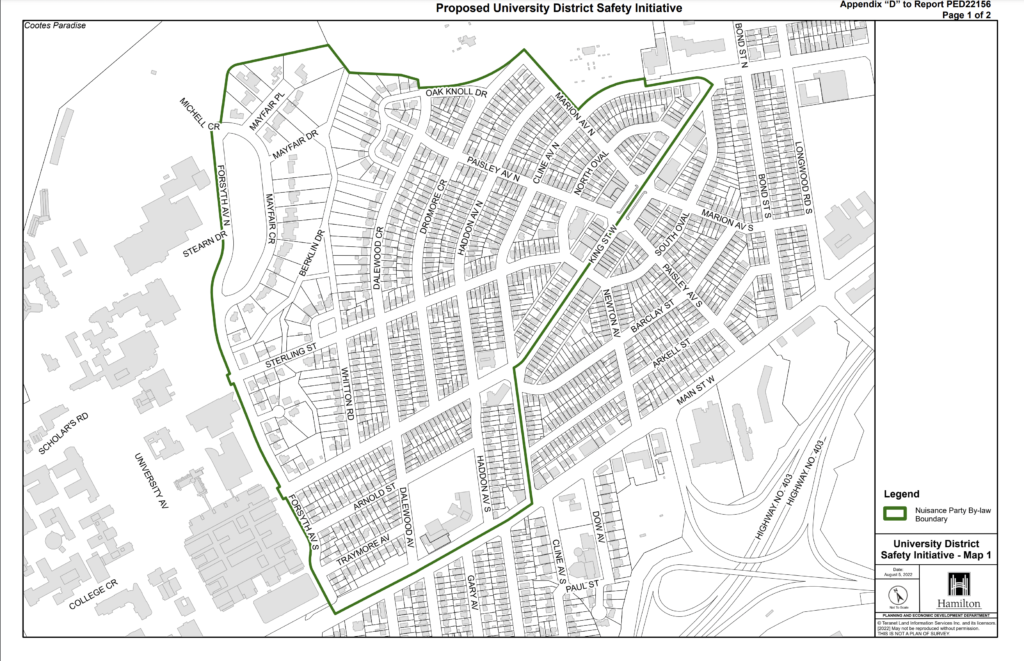
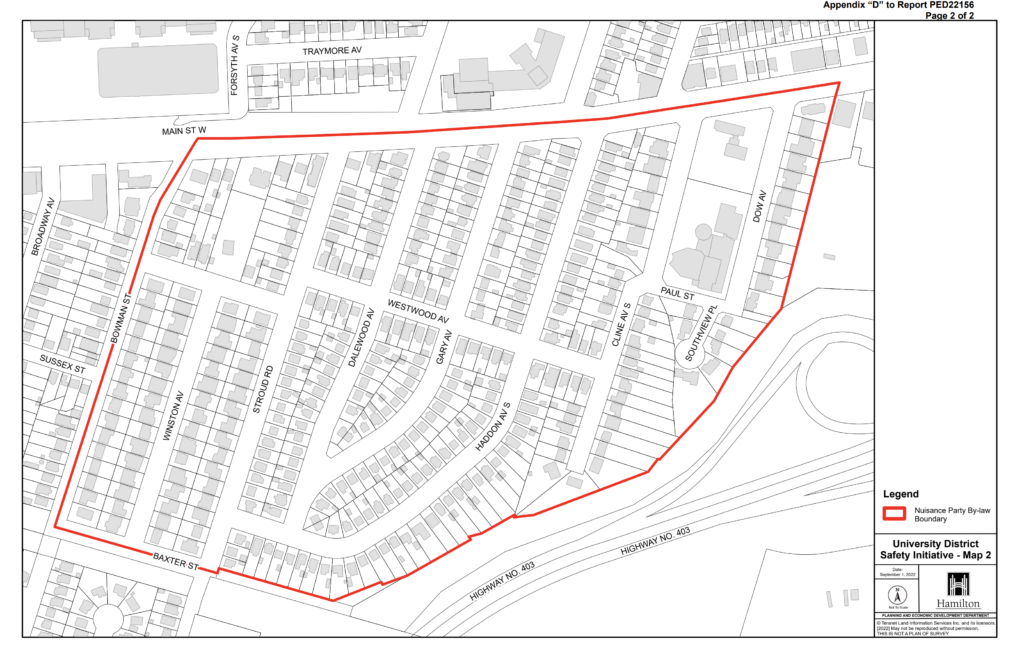
The UDSI is currently in effect from 12:00 a.m. on Sept. 28 to 11:59 p.m. on Oct. 2.
SIMILAR BYLAWS IN OTHER CITIES
Waterloo, London, Guelph, Brampton and Kingston all have implemented similar bylaws. Waterloo and Kingston were both directly consulted by Hamilton in preparation of the Sept. 6 report. Hamilton’s iteration of the nuisance party bylaw is remarkably similar to Kingston’s bylaw.
“Each representative [of bylaw enforcement in other municipalities] was supportive of nuisance party provisions, indicating it was beneficial to officers as an additional enforcement tool,” stated the bylaw report from Sept. 6.
The Silhouette reached out to the students’ unions at both the University of Waterloo and Queens University about whether they felt their bylaws have been used as an effective “enforcement tool”.
Alma Mater Society Queen’s Commissioner of External Affairs Sahiba Gulati said the bylaws did not stop students from forming large gatherings.
“With the bylaws in place [in Kingston], there have been some incidents where students were being wrongfully ticketed when passing by or not able to enter their student houses due to bylaw officers breaking up large gatherings on their streets. Last year especially was a bad year for us as we had police contact from all over the GTA including police on horses for the situation, making our students feel unsafe,” said Gulati in an emailed statement to the Silhouette.
Waterloo Undergraduate Student Association President Stephanie Ye Mowe shared similar sentiments about the effectiveness from the city of Waterloo’s bylaw.
“Nuisance bylaws can be useful tools, but fear of fines aren’t keeping students off the streets in this case and municipalities should recognize the risk of bylaws being weaponized against student communities,” said Ye Mowe in an emailed statement to the Silhouette.
Nuisance bylaws can be useful tools, but fear of fines aren’t keeping students off the streets in this case and municipalities should recognize the risk of bylaws being weaponized against student communities
Stephanie Ye MOwe, Waterloo Undergraduate Student Association President
THE ISSUES AND WHAT IT MEANS FOR STUDENTS
Upon a thorough reading of the Sept. 6 report, many contradictions were made with reference to how the bylaw will be enacted. The report makes reference to McMaster’s 2021 homecoming weekend; however, there has not been a university sanctioned homecoming event since 2019.
The report also states there were nearly 5,000 individuals in attendance at last year’s FOCO. While this is an accurate statement, it must be noted the city’s report does not acknowledge that the majority of charged “attendees” were not McMaster students.
The bylaw does not effectively state how these consequences will be enforced. As Singh noted, there is a worry that this bylaw will be used to target students, rather than be used as a tool to deter nuisance parties.
Hennick also stated external officers will be brought in to support HPS in their operations during the 2022 fake homecoming weekend. There is a large discrepancy between city spending of resources on last year’s FOCO compared to the St. Patrick’s Day party earlier this year, $27,000 and $202,858.05 respectively. Although Hennick indicated that the FOCO costs were only an estimation, this is still a large difference between costs.
Surveillance cameras have been set up on Dalewood Ave. with signs informing the community of their presence.
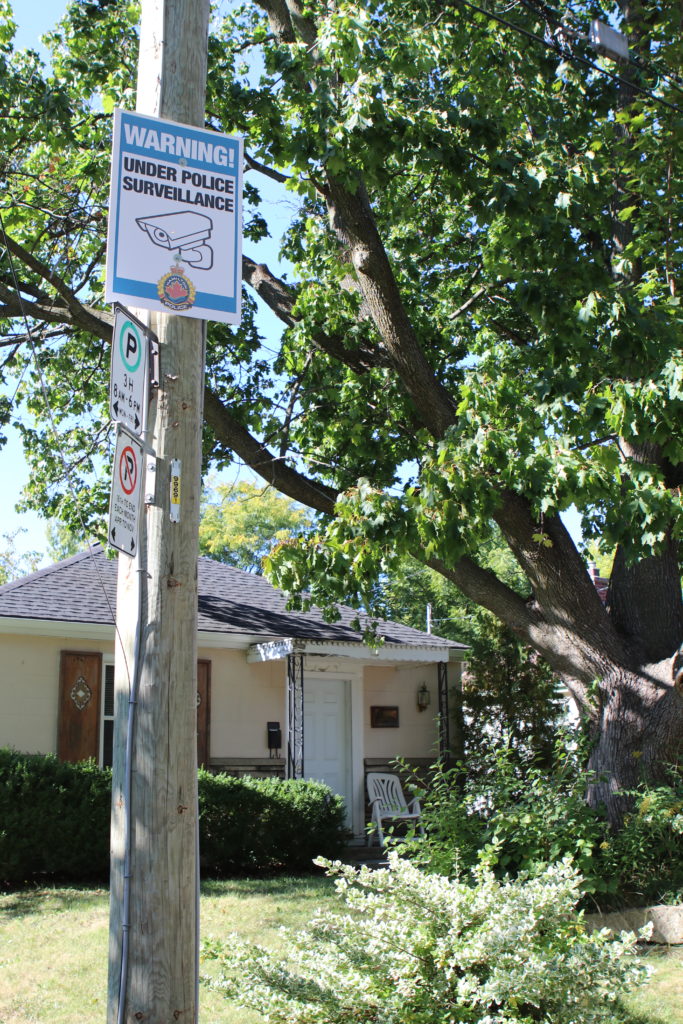
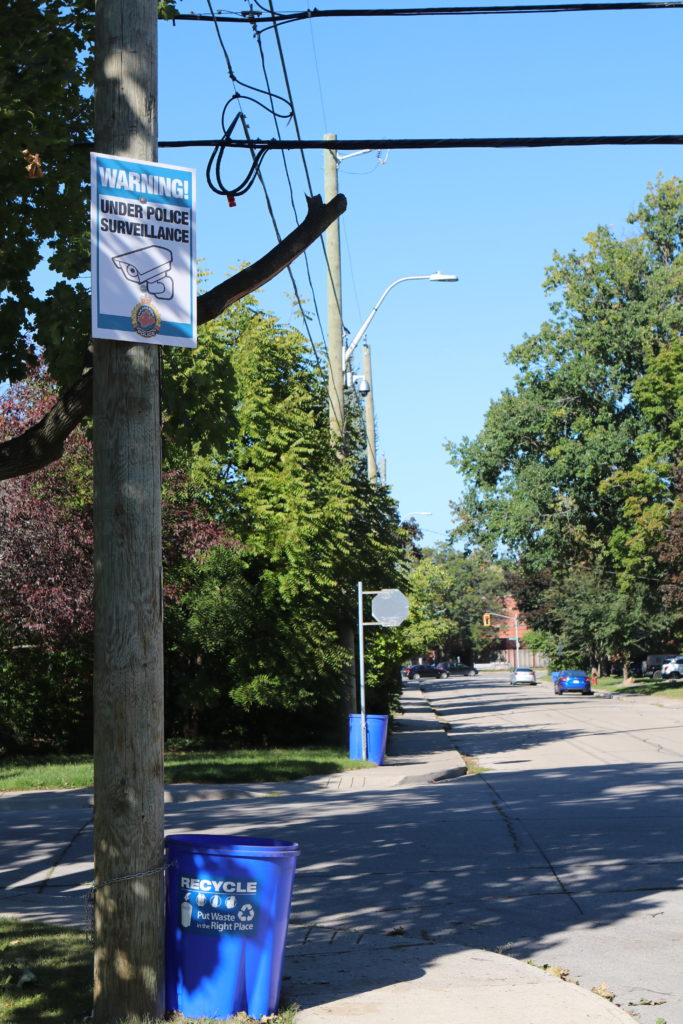
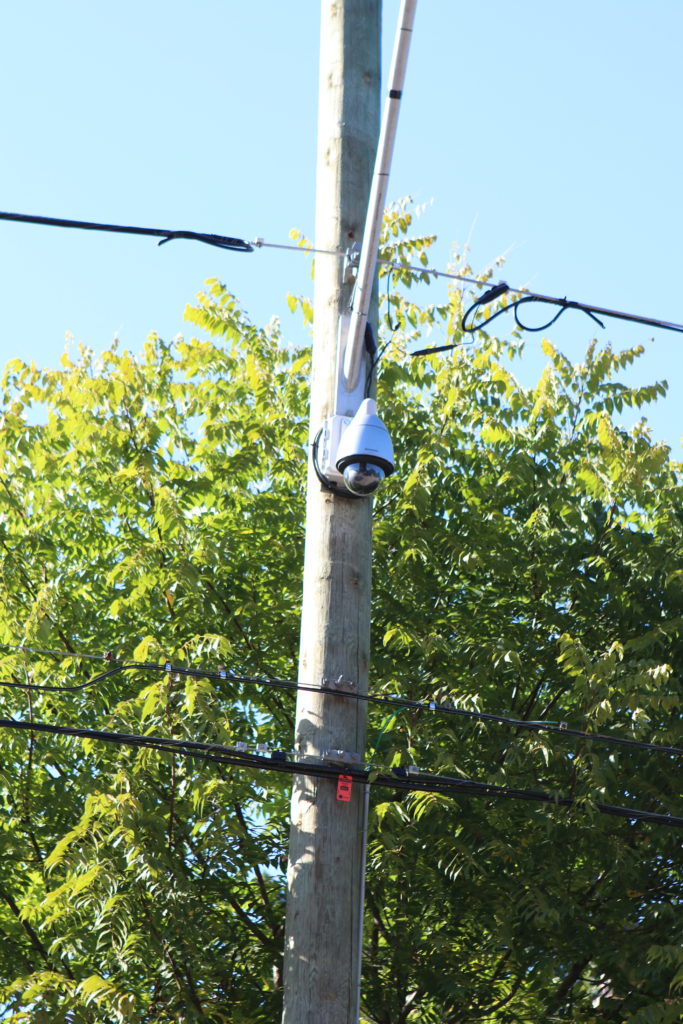
The Sept. 6 report goes on to break down four different reasons as to why the nuisance party bylaw would not be an effective use of city resources. First, police will always have to be present at large gatherings, which will always have a cost. Second, bylaw and police officers might not be able to determine who is responsible for causing a nuisance party. Third, as nuisance parties are advertised on social media, it further makes it difficult to determine who started it. Fourth and finally, a large number of attendees trespass on private property during a nuisance party, but the party does not necessarily involve the property owner or tenants. These properties are victims of nuisance parties, not active participants.
The city outlined the above issues, yet still maintained that it is for the good of the community to enact this bylaw.
“Despite these limitations, the inclusion of remedial costs allows for partial cost recovery for city services [and] may act as a deterrent for those considering hosting or creating a nuisance party,” stated the report.
The city of Hamilton failed to consider that students also comprise the community and the creation of this bylaw has the potential to damage their sense of community safety. This begs the question: why are students exempt from this feeling of community safety?
Why are students exempt from this feeling of community safety?
Ye Mowe weighed in on how nuisance bylaws had affected student morale living in Waterloo.
“Students have a reasonable right to enjoyment within their municipalities, just as any other residents. And even though bylaws may be created with good intentions, students and student associations have noted that bylaws can be over enforced in student neighbourhoods – having a negative, long-lasting impact on those who pay the fines and the communities they live in.” said Ye Mowe.
Students have a reasonable right to enjoyment within their municipalities, just as any other residents. And even though bylaws may be created with good intentions, students and student associations have noted that bylaws can be over enforced in student neighbourhoods – having a negative, long-lasting impact on those who pay the fines and the communities they live in.
Stephanie Ye MOwe, Waterloo Undergraduate Student Association President
Along the same lines, McMaster students should be cognizant that their elected Ward 1 councillor, who has stated that she will look out for their interests while they are students in Hamilton, was also the leading voice behind the creation of this bylaw which seemingly targets students at McMaster University.
The provincial university advocacy group, Ontario Undergraduate Student Alliance, released a policy paper in 2020 outlining the stance that students deserve equal treatment under Ontario municipal bylaws and should not be targeted, discriminated against or challenged by bylaw enforcement simply for being a student compared to a permanent resident of a city.
OUSA called on the Ministry of Municipal Affairs and Housing to create a system with accountability to better protect students from discriminatory bylaws. The organization also called on the Ministry of the Attorney General to release a statement, setting the precedence for students' status as a proxy of age, marital status or recipient of public assistance to grant more protection under the Ontario Human Rights Code.
The Sept. 6 report states that the nuisance party bylaw would be used as another tool to send a message to Hamiltonians that large unsanctioned gatherings would not be tolerated across the city. However, the UDSI was created to specifically target the areas surrounding McMaster University and expedite the process of declaring a nuisance party. McMaster University wasn’t consulted on which parts of the community would be considered for the UDSI, which already leaves out large areas of student housing and family homes in the west end of Hamilton.
“Again, we weren't involved in that process . . . I don't want to speculate. I'm not sure how they are they drew the maps, but certainly it is centered within our student community,” said Van Koughnett.
It should also be noted that landlords could be at risk of receiving fines on their property taxes due to the nuisance party bylaw; however, the same recurring issue of how the bylaw will be administered comes up once more.
“[The nuisance party bylaw] may encourage property owners/landlords to amend rental lease conditions for tenants to preclude these types of nuisance behaviours on the property,” stated the Sept. 6 report.
THE RECEPTION
The university, the MSU and the city are all concerned for public safety and the risk such large unsanctioned gatherings pose to the community. These concerns are warranted given not only the damage caused by last year’s FOCO, but also the events taking place at other universities, including Western University and University of Guelph, over the past few weeks at their own homecoming parties.
Both university administration and members of the MSU expressed their support for measures to mitigate these damages; however, they were also concerned about the implications of the current bylaw specifically for student safety.
“We support efforts to try to avoid and minimize the risks associated with large gatherings. So, if this bylaw helps to do that — and we hope that it does have an impact — then that’s a good thing . . . from the university standpoint, one of our main concerns is student health and safety. Anytime you get a large gathering like that, that's not managed in any way and there's obviously alcohol and other substances involved, there's a high degree of risk,” said Van Koughnett.
Singh echoed Van Koughnett’s thoughts and he also raised concerns about the potential for use of unnecessary force in the enforcement of the bylaw.
“[The MSU] shared concerns that some items may be up to interpretation by law enforcement when they actually are applying the bylaw and we're worried that may lead to cases of misapplication of force,” said Singh.
The city of Hamilton, McMaster University and the MSU have spent the week leading up to FOCO 2022 trying to educate students on the financial repercussions that the bylaw may have. Van Koughnett went door-to-door on Dalewood Ave. and visited students’ homes to chat with them about the implications of the imminent street party.
The city of Hamilton has also left flyers on the doorsteps of houses in the UDSI, informing potential partygoers of the new bylaw and warning them of the associated consequences through the nuisance party bylaw.
“Different partners are trying to use the tools at their disposal to try to manage this type of situation. So, in our case with McMaster, we tried to do a lot of education upfront and in this case one of our priorities is to educate students about this new bylaw because none of us want to see students . . . many of whom are trying to make financial ends meet, with a heavy fine,” said Van Koughnett.
I’m on Dalewood this morning to educate students about the #hamont new nuisance by-law, which carries fines of up to $10K, and to discourage the large gatherings that pose significant risks to the health & safety of our neighbours & @McMasterU community members. pic.twitter.com/rAukdpkjeD
— Sean Van Koughnett (@Sean_VK) September 26, 2022
We’ll see if the city’s efforts pay off to deter students from gathering on Dalewood Ave. this year.
This is an ongoing story.

